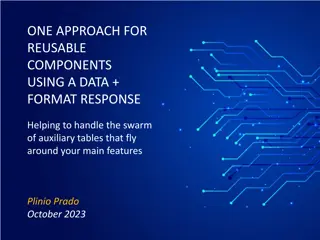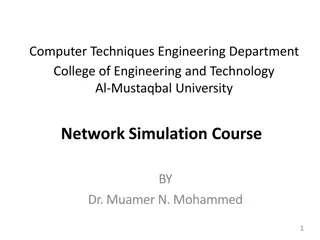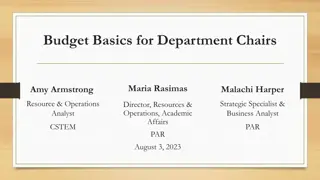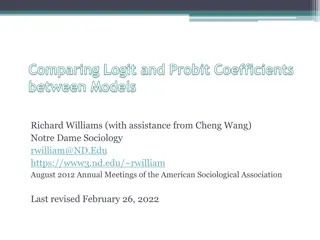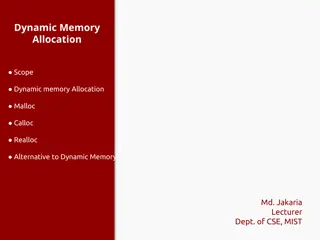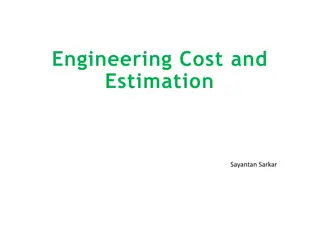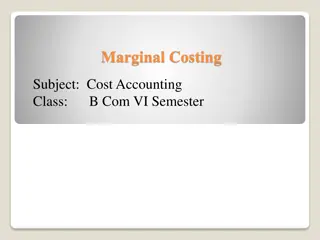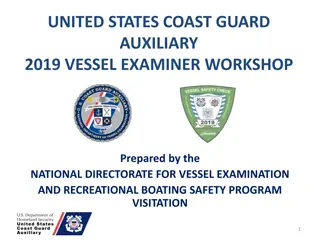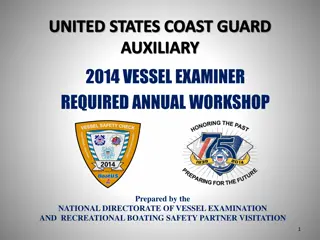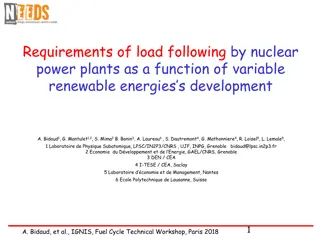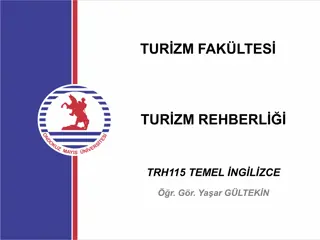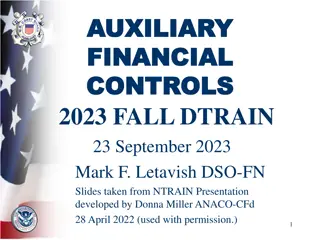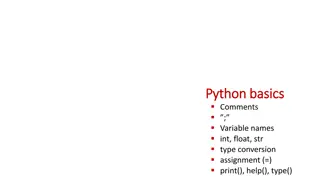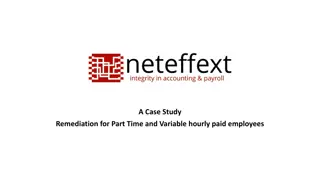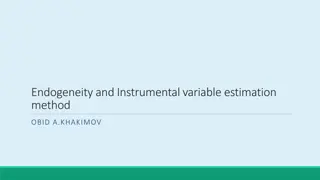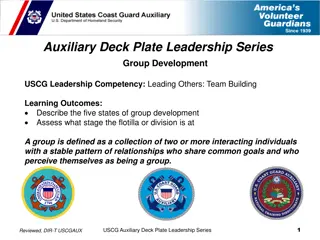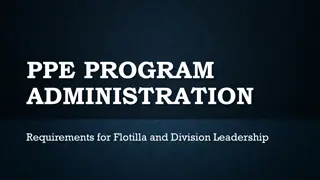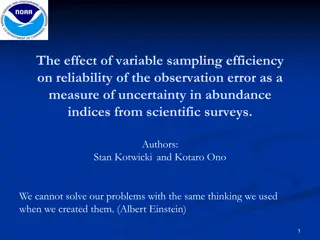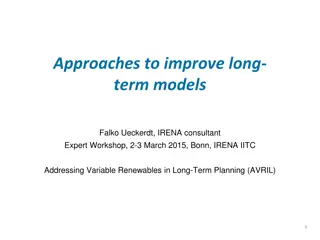Understanding Investigations in Science
Investigating in science involves various approaches beyond fair tests, such as pattern-seeking, exploring, and modeling. Not all scientists rely on fair tests, as observational methods are also commonly used. The scientific method consists of steps like stating the aim, observing, forming hypothese
1 views • 20 slides
Assertive to Interrogative: English Grammar Exercises and Practice
Enhance your English grammar skills with exercises on changing assertive sentences into interrogative ones. Learn how to transform sentences using auxiliary verbs, modal verbs, and without auxiliary verbs through practical examples and practice questions. Improve your sentence structure and comprehe
2 views • 24 slides
Handling Auxiliary Tables in Reusable Components
Approach for managing auxiliary tables efficiently within main features using a data format response. Presentation details Plinio Prado's exploration of different alternatives and his experience in transitioning front-end to TypeScript after the project. The talk emphasizes making informed choices o
0 views • 22 slides
Network Simulation Course on Variable Length Subnet Masks (VLSM) at Al-Mustaqbal University
This course, conducted by Dr. Muamer N. Mohammed at Al-Mustaqbal University's College of Engineering and Technology, focuses on Variable Length Subnet Masks (VLSM). The lectures cover VLSM techniques, subnetting with and without VLSM, application of VLSM, examples of VLSM implementation, and practic
2 views • 11 slides
Challenges and Opportunities in Harmonizing School Principals' Salaries
The retribution structure of school principals involves various components such as fixed salary, variable positions, and performance-based pay. The allocation of these components, particularly the variable portion, poses challenges due to discrepancies among regions. Despite recent increases, there
2 views • 16 slides
Budget Basics for Department Chairs - Understanding Funds and Processes
This document provides essential information on budget basics for department chairs, covering topics such as types of funds (state and auxiliary), fiscal authority, budget reconciliation, procard and purchasing procedures, and timeline for budget processes. It outlines different funds like General F
0 views • 18 slides
Understanding the Concept of Return to Factor in Production Economics
Return to Factor is a key concept in production economics that explains the relationship between variable inputs like labor and total production output. The concept is based on the three stages of production - increasing returns, diminishing returns, and negative returns. By analyzing the behavior o
0 views • 7 slides
Plastic Processing Auxiliary Equipment Market to be Worth $9 Billion by 2030
Explore $9 billion plastic processing auxiliary equipment market: Get exclusive insights on key market trends, segments, geographical analysis, & competitive analysis!\n
0 views • 5 slides
Comparing Logit and Probit Coefficients between Models
Richard Williams, with assistance from Cheng Wang, discusses the comparison of logit and probit coefficients in regression models. The essence of estimating models with continuous independent variables is explored, emphasizing the impact of adding explanatory variables on explained and residual vari
1 views • 43 slides
Computation of Machine Hour Rate: Understanding MHR and Overhead Rates
Computation of Machine Hour Rate (MHR) involves determining the overhead cost of running a machine for one hour. The process includes dividing overheads into fixed and variable categories, calculating fixed overhead hourly rates, computing variable overhead rates, and summing up both for the final M
4 views • 18 slides
Understanding Variable Declarations and Conversions in Java
Properly declaring variables in Java is essential before using them. This chapter covers different types of variable declarations, including class variables, instance variables, local variables, and parameter variables. It also explains the concept of type casting and the importance of explicitly de
1 views • 23 slides
Understanding Dynamic Memory Allocation and Variable Scope in Programming
This content delves into the concepts of dynamic memory allocation, variable scope, and the lifetime of local variables in programming. It explores the scopes of variables in different contexts and addresses issues like dangling pointers and out-of-scope references. The images provided visually enha
0 views • 40 slides
Laws of Production in Economics
The content discusses the laws of production in economics, including the law of variable proportion in the short run and the law of returns to scale in the long run. It explains the concepts of total product, average product, and marginal product, along with the stages of production. The law of vari
0 views • 18 slides
Understanding the Production Function and Laws of Production
Production function expresses the relationship between inputs and outputs, showcasing how much can be produced with a given amount of inputs. The laws of production explain ways to increase production levels, including returns to factors, law of variable proportions, and returns to scale. The law of
2 views • 20 slides
Understanding Multiple Baseline Designs in Behavioral Experiments
Multiple Baseline Designs are a type of experimental design used in behavioral research. This design involves measuring two or more behaviors concurrently in a baseline condition, applying a treatment variable to one behavior at a time while maintaining baseline conditions for others, and then seque
0 views • 34 slides
Understanding Engineering Costs and Estimation Methods
This informative content delves into the concept of engineering costs and estimations, covering important aspects such as fixed costs, variable costs, semi-variable costs, total costs, average costs, marginal costs, and profit-loss breakeven charts. It provides clear explanations and examples to hel
0 views • 33 slides
Effectiveness of Green Auxiliary Warning Lights on Winter Maintenance Trucks - MDOT Research
Presentation by MDOT on the implementation and research findings of green auxiliary warning lights on winter maintenance trucks. The research project aimed to confirm the effectiveness of green lights, alone or in combination with amber, based on visibility and glare tests. Results indicated that gr
7 views • 12 slides
Understanding Marginal Costing in Cost Accounting
Marginal Costing is a cost analysis technique that helps management control costs and make informed decisions. It involves dividing total costs into fixed and variable components, with fixed costs remaining constant and variable costs changing per unit of output. In Marginal Costing, only variable c
1 views • 7 slides
Ratio Method of Estimation in Statistics
The Ratio Method of Estimation in statistics involves using supplementary information related to the variable under study to improve the efficiency of estimators. This method uses a benchmark variable or auxiliary variable to create ratio estimators, which can provide more precise estimates of popul
0 views • 30 slides
United States Coast Guard Auxiliary Vessel Examiner Workshop 2019
The United States Coast Guard Auxiliary conducted the 2019 Vessel Examiner Workshop focusing on the Vessel Safety Check (VSC) program, the importance of becoming a Vessel Examiner, workshop objectives, general information for Vessel Examiners, and VE currency requirements. The program aims to promot
0 views • 48 slides
United States Coast Guard Auxiliary 2014 Vessel Examiner Workshop
The United States Coast Guard Auxiliary's 2014 Vessel Examiner Workshop focuses on educating Vessel Examiners to enhance boating safety and ensure compliance with safety regulations. The workshop covers VSC procedures, conducting safety checks, and operational facilities for paddle crafts. It includ
1 views • 111 slides
2020 Company Confidential - Add-Ons and Variable Properties Guidelines
This document provides guidelines for add-ons and variable properties within the context of the 2020 Company Confidential data. It covers various aspects such as variable validations, logic return types, export/import considerations, and the handling of accessory items. The content emphasizes the pr
0 views • 39 slides
Load Following by Nuclear Power Plants in Relation to Variable Renewable Energies' Development
The study explores the requirements of load following by nuclear power plants in the context of variable renewable energies' growth. It discusses the impact of renewable energy development on nuclear economic models and the need for dispatchable capacities. Benchmarks are set to test robustness of d
0 views • 11 slides
Understanding the Present Perfect Tense in English Grammar
The present perfect tense in English grammar is a combination of the present tense and perfect aspect used to express past events with present consequences. It is formed using the auxiliary verb "have" and the past participle of the main verb. This tense is essential for indicating completed actions
0 views • 27 slides
Financial Controls and Procedures for Auxiliary Units
Establishment of Standard Operating Procedures (SOP) to ensure control and management of Auxiliary Unit Funds, guided by regulatory frameworks and leadership appointments in place to safeguard against financial risks and conflicts of interest.
0 views • 88 slides
Python Basics: Comments, Variable Names, Assignments, and More
Learn about the basics of Python programming, including the use of comments to explain code, defining variable names, type conversion, assignment operators, and general guidelines for coding practices. Explore how to effectively use comments to describe code functionality and understand the signific
0 views • 21 slides
Understanding Clitic Placement in Bosnian/Croatian/Serbian
This examination delves into configurations in Bosnian/Croatian/Serbian (B/C/S) language where the tensed verb acts as an auxiliary clitic, positioned either after or inside the first conjunct. It analyzes agreement phenomena involving auxiliary verb clitics and explores different values of features
0 views • 49 slides
Effective Goal Setting Strategies for Unit Success in USCG Auxiliary Leadership
Planning and goal setting are crucial for unit success in USCG Auxiliary leadership. This article discusses seven key steps for successful goal setting, emphasizes the importance of total planning for unit success, and offers insights on making the right changes to bridge the gap between current and
0 views • 10 slides
Remediation Strategies for Part-Time and Variable Hourly Employees in Holiday Act Compliance
This case study delves into the challenges faced in managing leave liabilities for part-time and variable hourly employees under the Holidays Act 2003. It explores various working profiles such as split shifts, cycle shifts, variable shifts, and seasonal work, presenting issues in calculating leave
0 views • 18 slides
Understanding Endogeneity and Instrumental Variable Estimation Methods
Endogeneity in econometrics can create challenges such as omitted variables bias, measurement error, simultaneous causality, and using lagged values. This can affect the accuracy of models. One way to address this is through instrumental variable estimation methods. These methods help deal with endo
0 views • 42 slides
Khasi Grammar: Verbs and Auxiliary Verbs Explained
Learn about Khasi grammar, including verbs, auxiliary verbs, conjugation rules, and sentence structure. Explore examples and understand how to use verbs in Khasi accurately with practical insights.
0 views • 12 slides
Understanding the Usage of Auxiliary Verbs Do, Did, Does
Learn how to effectively use auxiliary verbs do, did, and does to give emphasis to verbs, contradict negative statements, avoid verb repetition, and complete statements. Enhance your English language skills by mastering the proper usage of these essential auxiliary verbs.
0 views • 9 slides
Understanding Echo Questions and Auxiliary Verbs in English Grammar
Learn about echo questions and auxiliary verbs in English grammar through exercises and examples. Discover how to respond to positive and negative sentences using appropriate auxiliary verbs. Practice forming echo questions with different verb tenses and sentence structures. Enhance your understandi
0 views • 7 slides
Strategies for Improving Unit Engagement in USCG Auxiliary
Enhance unit engagement within the USCG Auxiliary by being a leader they can believe in, empowering members, fostering a positive work environment, building confidence, and providing constructive feedback to boost morale and productivity. Recognize achievements, offer growth opportunities, and maint
0 views • 9 slides
Understanding Group Development Stages in USCG Auxiliary Leadership
Explore the five stages of group development - Forming, Storming, Norming, Performing, and Adjourning - in the context of the USCG Auxiliary leadership series. Assess the current stage of the flotilla or division based on behaviors and characteristics exhibited by members. From initial caution and c
0 views • 9 slides
PPE Program Administration Guidelines for Flotilla and Division Leadership
This document outlines the requirements, responsibilities, and goals for the administration of Personal Protective Equipment (PPE) programs for Flotilla and Division leaders within the context of Auxiliary operations. It details the necessary policies, procedures, and funding considerations to ensur
0 views • 34 slides
Understanding Variable Sampling Efficiency in Scientific Surveys
Exploring the impact of variable sampling efficiency (qe) on the reliability of observation error in abundance indices from scientific surveys. Authors delve into the complexities of survey design, factors affecting qe, and the need to adapt to variable efficiency. Studies show both random and non-r
0 views • 29 slides
U.S. Coast Guard Ninth District Auxiliary Operations Policy
This document outlines the operations policy of the U.S. Coast Guard Ninth District Auxiliary for the Eastern Region, covering aspects such as missions, SAR ethos, entry into Canadian territory, SAR mission coordinator duties, on-scene coordinator responsibilities, and risk assessment protocols.
0 views • 81 slides
Effective Delegation Strategies in USCG Auxiliary Leadership
Delegation is vital in the USCG Auxiliary, requiring careful consideration of individuals' skills, workload, and goals. Successful delegation involves clearly articulating outcomes, providing support, maintaining control through timelines and reviews. By following these steps, delegation can be done
0 views • 5 slides
Enhancing Long-Term Energy Models for Variable Renewables
Explore approaches to enhance long-term energy models for integrating variable renewables in long-term planning. Key aspects include improving generation networks, ensuring sufficient capacity and reliability, flexibility, robustness to contingencies, and security considerations. Temporal matching o
0 views • 22 slides


